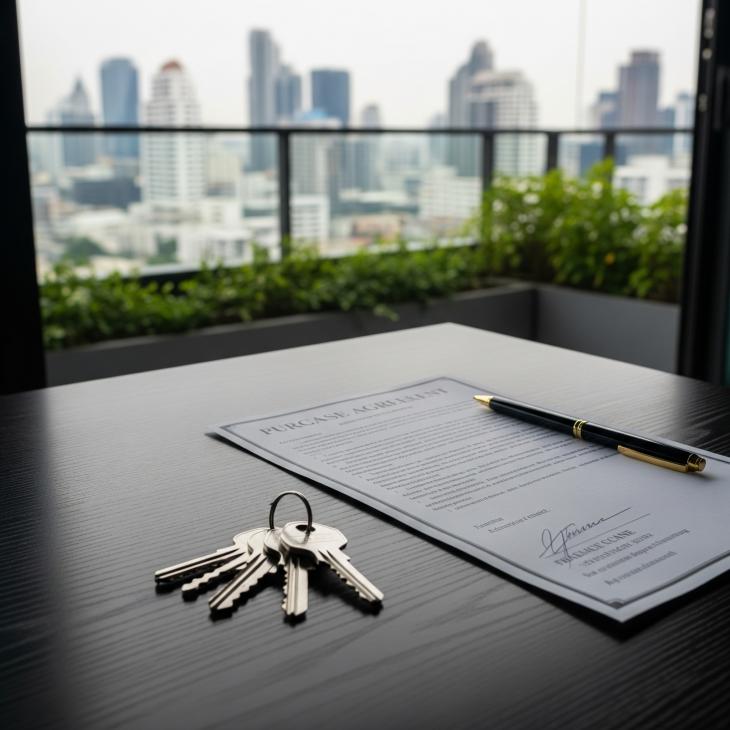Purchasing a condominium in Thailand can be an excellent investment and a way to secure your own piece of paradise. However, the legal landscape can be complex, especially for foreign nationals. At PS Law & Business, we specialize in assisting foreigners with seamless and secure condominium purchases across Thailand, particularly in Bangkok.
Understanding Foreign Ownership of Condominiums in Thailand
Thai law permits foreigners to own condominiums outright in their own name, provided certain conditions are met. This is a significant advantage compared to land ownership, which is generally restricted for non-Thais. The key requirements for foreign condominium ownership include:
- The condominium unit must be part of a legally registered condominium project.
- No more than 49% of the total unit floor area in a condominium building can be foreign-owned. This is often referred to as the "foreign ownership quota."
- The funds used for the purchase must be remitted from overseas into Thailand in foreign currency and properly documented.
The Condominium Purchase Process for Foreigners
Navigating the Thai property market requires careful due diligence and an understanding of the legal procedures. Here’s a general outline of the steps involved when a foreigner buys a condominium in Thailand:
- Property Search and Selection: Identify a suitable condominium unit. It's advisable to work with reputable real estate agents and a lawyer at this early stage.
- Due Diligence: This is a critical step. Your lawyer will conduct a thorough investigation, including:
- Verifying the seller's ownership title (Chanote).
- Checking the foreign ownership quota for the specific condominium building.
- Reviewing the condominium juristic person's rules, regulations, and financial health.
- Ensuring there are no outstanding debts or legal encumbrances on the property.
- Reservation Agreement: Once satisfied with the due diligence, you may sign a reservation agreement and pay a small deposit to take the unit off the market.
- Sale and Purchase Agreement (SPA): Your lawyer will review or draft a comprehensive SPA. This legally binding contract outlines the terms and conditions of the sale, including the price, payment schedule, transfer date, and responsibilities of each party. It is crucial to fully understand all clauses before signing.
- Funds Remittance: You must transfer the purchase funds from overseas into Thailand in foreign currency. The receiving bank in Thailand will issue a Foreign Exchange Transaction Form (FETF) or a credit note for amounts over USD 50,000 (or its equivalent), which is essential proof for registering foreign ownership. For amounts under this threshold, other bank documentation may suffice.
- Registration of Ownership: On the agreed transfer date, you (or your lawyer acting under a Power of Attorney) will meet the seller at the relevant Land Department office to register the ownership transfer and pay the remaining balance and applicable taxes and fees. The title deed (Chanote) will then be updated with your name as the legal owner.
How PS Law & Business Can Assist You
Our experienced property lawyers at PS Law & Business provide comprehensive legal services for foreigners purchasing condominiums in Thailand, including:
- Legal consultation and advice on Thai property law.
- Thorough due diligence on the condominium unit and project.
- Reviewing and drafting Reservation Agreements and Sale and Purchase Agreements.
- Advising on the process of remitting funds to Thailand and obtaining necessary bank documentation (e.g., FETF).
- Preparing all necessary documents for ownership registration.
- Representing you at the Land Department for the ownership transfer (if required, via Power of Attorney).
- Assistance with understanding and navigating condominium juristic person rules and common area fees.
- Post-purchase support and advice.
We are committed to protecting your interests and ensuring your condominium purchase in Thailand is a smooth and secure transaction. Contact us today for a consultation.
FAQ: Buying a Condominium in Thailand
Can a foreigner get a mortgage in Thailand to buy a condo?
Generally, it is very difficult for foreigners who are not residents or do not have significant work ties in Thailand to obtain a mortgage from a Thai bank. Most foreigners purchase condominiums with cash or financing from their home country.
What are the typical taxes and fees involved in a condo purchase?
Several taxes and fees apply, usually shared between the buyer and seller, depending on the agreement. These can include:
- Transfer fee (typically 2% of the appraised value or registered sale price).
- Specific Business Tax (SBT) (3.3% if the seller has owned the property for less than 5 years).
- Stamp Duty (0.5% - usually applicable if SBT is not).
- Withholding tax (applicable if the seller is a company or an individual earning income).
- Legal fees.
Your lawyer will clarify these costs based on your specific transaction.
What is a Chanote?
A Chanote (Nor Sor 4 Jor) is the strongest type of property title deed in Thailand, confirming full ownership rights. When purchasing a condominium, the Chanote will be in your name as the legal owner.
What happens if the foreign ownership quota in a building is full?
If the 49% foreign ownership quota is full, a foreigner cannot purchase a unit in that condominium building under their own name. They might consider a leasehold agreement, but this does not grant outright ownership.
Do I need to be in Thailand for the purchase process?
While it is advisable to view the property and be present for key stages if possible, much of the process, including the final transfer of ownership, can be handled by your lawyer through a legally drafted Power of Attorney.
External Links
- Thailand Board of Investment (BOI) - Offers general information for foreigners in Thailand.
- Department of Lands - The government authority responsible for land and property registration (Note: The English version of the website may have limited information).


